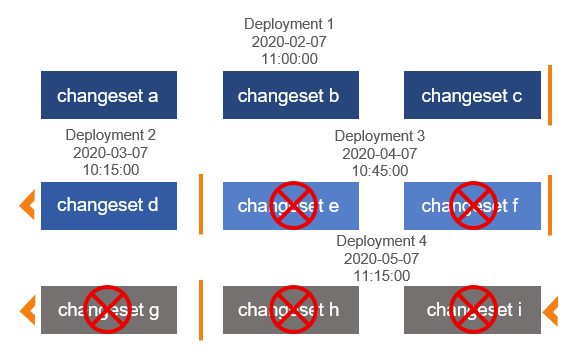rollback-to-date
Last updated: September 2, 2025
The rollback-to-date command reverts your database to the state it was in at the date and time you specify.
Uses
The rollback-to-date command is mainly used when you want to revert all changes made to your database from today's date to the date and time you specify. The rollback-to-date command reverts those changesets to their previous state and allows you to target the date and time without impacting changes or deployments that came before the date and time you specified.
The image below shows four deployments performed at a different times: March, April, May, and February. Let's imagine that your current month is May and you want to roll back your database to March.
As you can see, the rollback-to-date command allows you to target deployment 2 performed on March 07, 2020 10:15 AM and revert all changes associated with deployments 4 through 2, to March without impacting the previous deployments—deployment 2 and 1.
Note: There are several ways to revert your changes with the rollback-to-date command. You can use YYYY-MM-DD HH:MM:SS or YYYY-MM-DD'T'HH:MM:SS formats to specify both date and time. Also, you can specify date or time only.

In Liquibase Secure 4.27.0 and later, you can automatically generate a database Rollback Report summarizing this command.
Impact
The use of rollback-to-date comes with risk of removing all changes from today's date to the date you specified. Also, there is an additional impact to the DATABASECHANGELOG table. When any change is rolled back, the row associated with that change is deleted from the DATABASECHANGELOG table. For this reason, look for unintended consequences before using this command.
It is a best practice is to run the rollback-to-date-sql helper command because it allows you to inspect the rollback-to-date SQL and search for any potential mistakes before you execute the rollback-to-date command.
Syntax
Before running the rollback-to-date command, run the history command to see the dates of all your previous changes.
To run the rollback-to-date command, specify the driver, classpath, and URL in the Liquibase properties file. You can also specify these properties in your command line.
Then run the rollback-to-date command:
liquibase rollback-to-date --date=2020-05-07 --changelog-file=example-changelog.xml
* Liquibase will check nested changelogs for definitions of the changesets to rollback.
Note: The username and password attributes are not required for connections and systems which use alternate means of authentication. Also, you can specify database credentials as part of the url attribute.
Command parameters
Attribute | Definition | Requirement |
| The root changelog | Required |
| The date and time your database rolls back to. The date format is | Required |
| The JDBC database connection URL. | Required |
| Fully-qualified class which specifies a | Optional |
| Path to a properties file for the | Optional |
| Specifies the changeset contexts to match. Contexts are tags you can add to changesets to control which changesets are executed in any particular migration run. Note: If you use Liquibase 4.23.0 or earlier, use the syntax | Optional |
| Name of the default catalog to use for the database connection | Optional |
| Name of the default schema to use for the database connection. If Note: In the properties file and Note: In Liquibase 4.12.0 and later, you can use mixed-case schema names if you set | Optional |
| The JDBC driver class | Optional |
| The JDBC driver properties file | Optional |
| Specifies the changeset labels to match. Labels are tags you can add to changesets to control which changesets will be executed in any migration run. | Optional |
| Password to connect to the target database. | Optional |
| Enables a report at the command level. Overrides the global parameter | Optional |
| Specifies the name of the report file at the command level. Overrides the global parameter | Optional |
| Specifies the file path to the report file at the command level. Overrides the global parameter | Optional |
| Liquibase 4.31.0+. Specifies whether to hide exceptions (which may contain SQL) from the operation report at the command level. Overrides the global parameter If If | Optional |
| Liquibase 4.31.0+. Specifies whether to hide changeset SQL in operation reports at the command level. Overridden by the global parameter | Optional |
| The path to the script to use to perform the rollback. Only needed if the rollback is not already defined in the changelog, and if it is not a rollback statement that is automatically generated by Liquibase. | Optional |
| Username to connect to the target database. | Optional |
Output
Liquibase Community 4.9.1 by Liquibase
Liquibase command 'rollback-to-date' was executed successfully.